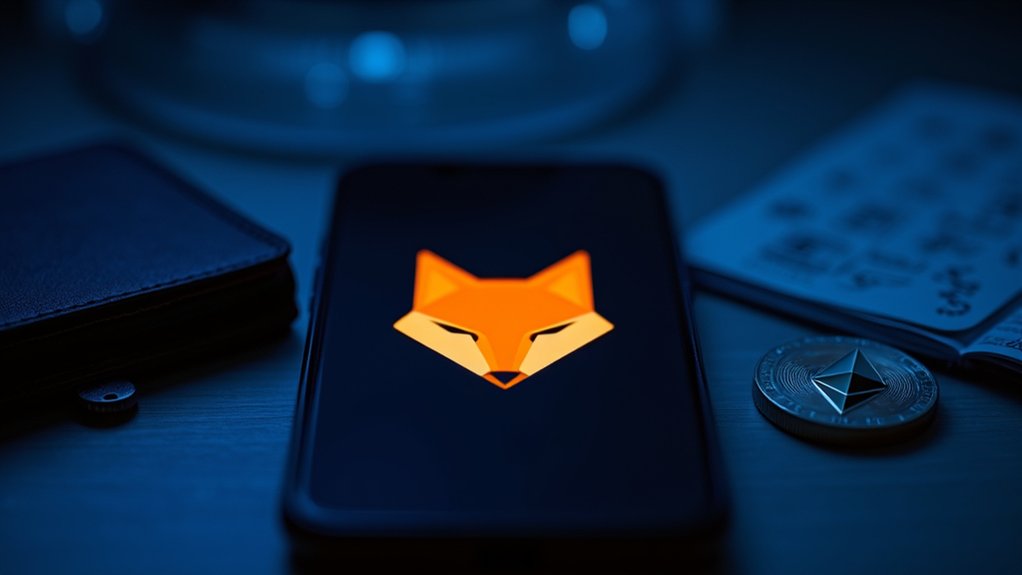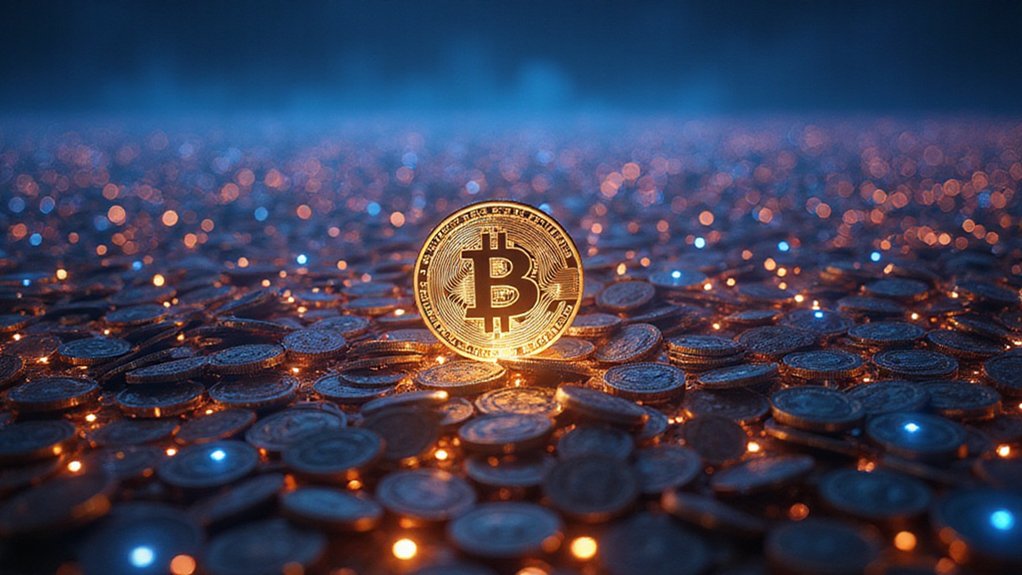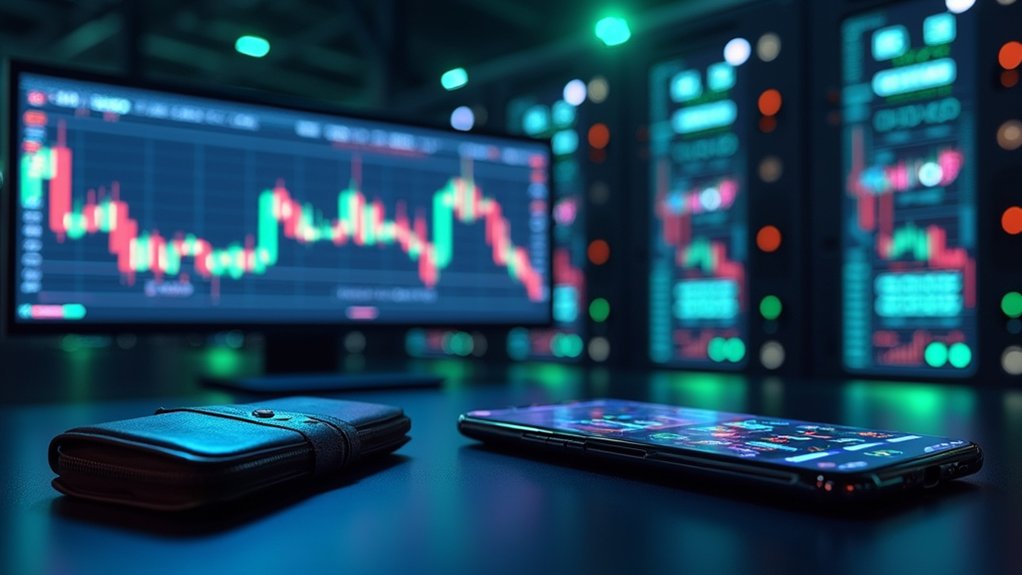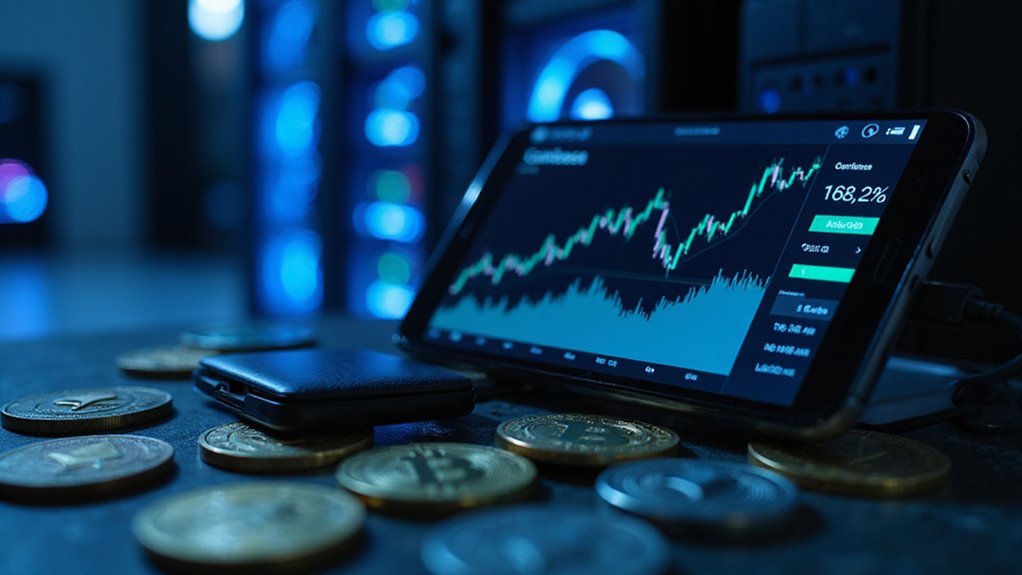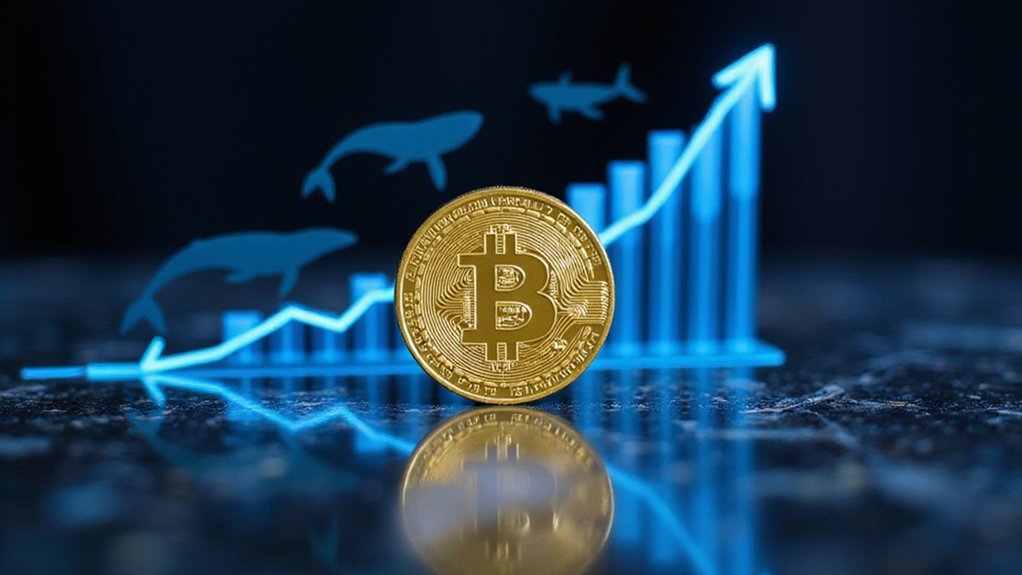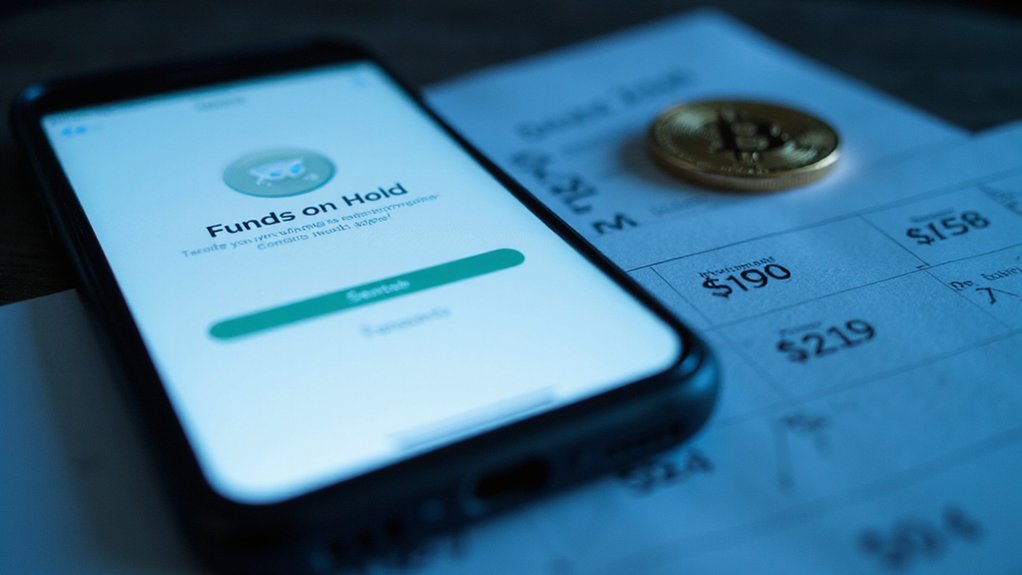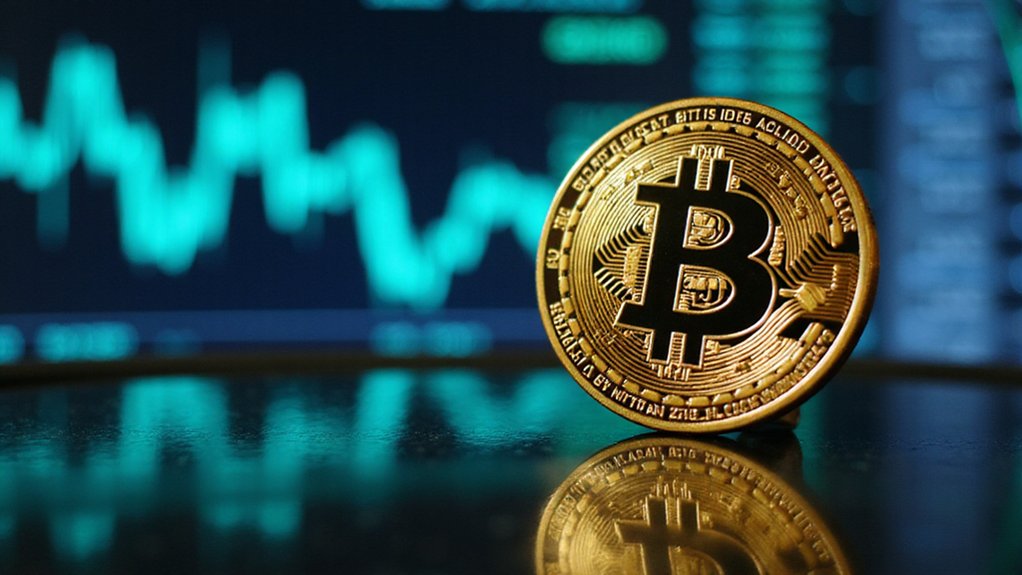MetaMask functions as both a self-custody cryptocurrency wallet and a portal to the sprawling Ethereum ecosystem. Available as a browser extension or mobile app, it safeguards users’ private keys locally while facilitating interactions with decentralized applications, token swaps, and NFT marketplaces. With over 100 million users worldwide, this digital Swiss Army knife handles everything from basic transactions to complex DeFi maneuvers—all without relinquishing control of one’s digital assets. The decentralized revolution awaits behind its fox-emblazoned interface.
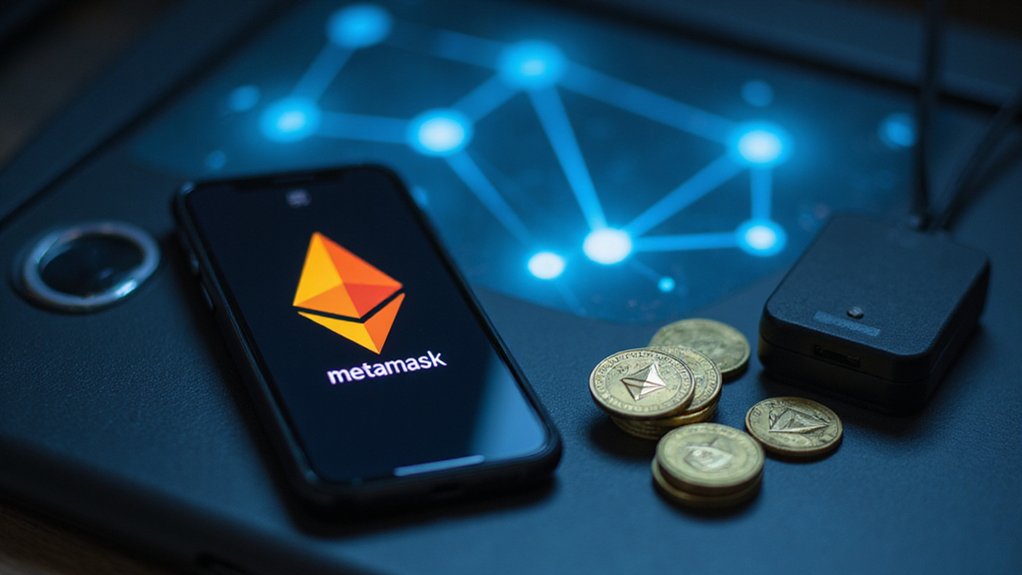
MetaMask stands as the quintessential gateway to the Ethereum blockchain, functioning as a software cryptocurrency wallet that has transformed how over 100 million users worldwide interact with Web3 technologies.
Available as both a browser extension and mobile application, this versatile tool enables users to store, manage, and transact with Ethereum and compatible tokens—including the ubiquitous ERC-20 standards and the increasingly valuable ERC-721 NFTs—without requiring technical blockchain expertise.
At its core, MetaMask operates as a self-custody “hot wallet,” maintaining an internet connection while employing cryptographic safeguards through public-private key architecture.
The wallet’s security model—hardly revolutionary but nonetheless effective—relies on locally stored private keys and a 12-word seed phrase, which functions as the ultimate recovery mechanism should one’s device suffer an untimely demise. Users can either create a new wallet from scratch or import existing wallets using this seed phrase for seamless recovery and access.
Password protection adds another layer of defense, though its effectiveness is, naturally, contingent upon users avoiding “password123” and similarly inspired strokes of genius.
The wallet connects to Ethereum nodes via Infura, sparing users the considerable inconvenience of running full nodes (an undertaking that would otherwise require substantial storage resources and technical acumen).
This connection facilitates interaction with smart contracts—those self-executing marvels of code that underpin much of blockchain’s utility—and enables direct peer-to-peer transactions without traditional financial intermediaries.
MetaMask’s interface strikes a delicate balance between accessibility and functionality, offering features for both crypto neophytes and veterans.
Users can purchase ETH directly, swap tokens through integrated decentralized exchange aggregators, and seamlessly connect to countless dApps spanning DeFi protocols, NFT marketplaces, and blockchain-based games. The service charges a 0.875% service fee on all token swaps made through its aggregation feature.
The wallet prioritizes user security with Wallet Guard built in, offering protection against scams and frontrunning attacks while providing timely security alerts.
The wallet extends beyond Ethereum to support multiple networks, including BNB Smart Chain, thereby expanding its utility across the blockchain ecosystem.
Perhaps most notably, MetaMask embodies the core ethos of decentralization: users maintain complete control of their assets and digital identity, with private keys never leaving their devices unless explicitly authorized for transaction signing—a welcome departure from the “trust us” model that permeates traditional financial services.
Frequently Asked Questions
Can Metamask Be Hacked?
Yes, MetaMask can be hacked through several vectors—though “hack” often mischaracterizes what are basically user-targeted attacks.
Technical vulnerabilities like the “Demonic” flaw (CVE-2022-32969) have exposed recovery phrases, while social engineering remains the predominant threat vector through phishing websites and fake extensions.
Even MetaMask’s own infrastructure isn’t immune, as evidenced by the March 2025 maintainer account compromise.
A hardware wallet integration remains the prudent supplementary defense against these multifaceted threats.
How Much Are Metamask Fees?
MetaMask charges a 0.875% fee on token swaps, while network gas fees vary based on blockchain congestion (particularly steep on Ethereum during high-traffic periods).
Bridge transactions incur additional costs, including liquidity provider fees and destination network gas fees.
Fiat transactions come with a 1% markup.
Importantly, MetaMask’s Gas Station feature now incorporates network fees into swap quotes—a small mercy in the often opaque world of crypto transaction costs.
Is Metamask Available in All Countries?
MetaMask’s wallet functionality is available globally without geographic restrictions—a rather welcome departure from the usual territorial fragmentation of financial services.
The self-custodial wallet operates wherever users have internet access and compatible devices.
However, the MetaMask Card (still in its pilot phase) remains limited to specific regions including Argentina, Brazil, Colombia, Mexico, the EEA, Switzerland, the UK, and select US states.
Regional payment partnerships have further expanded accessibility in countries like Vietnam, Indonesia, and Egypt.
Can I Recover My Metamask Wallet Without Seed Phrase?
Recovering a MetaMask wallet without a Secret Recovery Phrase is, unfortunately, an exercise in futility for most users.
The decentralized architecture that makes crypto appealing also renders traditional “forgot password” mechanisms obsolete.
Without the 12-word phrase, options narrow dramatically to specialized vault decryption tools (requiring prior device access and passwords) or automated vault recovery on mobile.
MetaMask’s design philosophy prioritizes self-sovereignty over convenience—a principle that becomes painfully evident upon phrase loss.
Does Metamask Report to Tax Authorities?
MetaMask, as a non-custodial wallet, doesn’t directly report user transactions to tax authorities.
The platform maintains its position firmly in the “connection” business rather than the “surveillance” one.
However, users shouldn’t mistake this for tax immunity—blockchain transactions remain publicly visible, and integrated third-party services (particularly fiat on-ramps requiring KYC) may have their own reporting obligations.
The responsibility for proper tax compliance ultimately rests with users, not their digital wallet providers.
